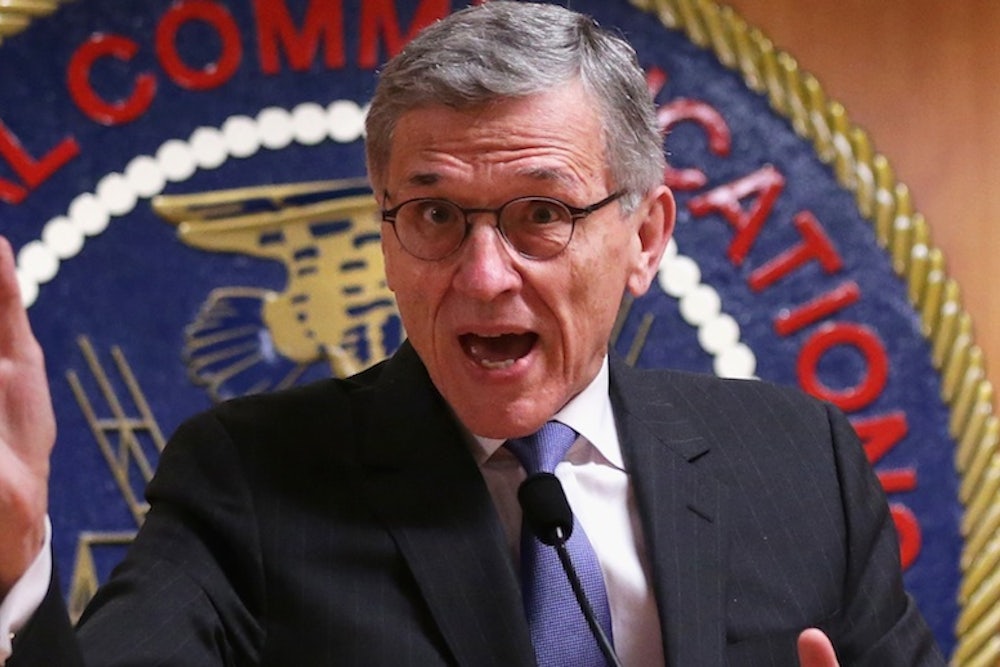At the beginning of today’s meeting of the Federal Communications Commission to present proposals on net neutrality, three demonstrators stood up to denounce the proceedings. “We want the FCC to do its job to regulate the internet for the people not for the corporations,” one of them declared before being hustled out of the room. After the demonstrators were removed, Tom Wheeler, the former cable industry lobbyist whom President Obama appointed to chair the FCC, opened the proceedings. Wheeler warned that “disruption doesn’t help getting to the point where the American people can provide input to the process.” Wheeler explained that the purpose of his proposals on what he called “the open internet” was to allow “American people to provide input.”
But it’s unlikely that anyone who doesn’t have a degree in information science, or a legal specialization in communications law, or works for one of the relevant lobbying groups will be able to make heads or tails of Wheeler’s proposals, which were couched in bureaucratic and technical gobbledygook. I suspect they were written precisely not to allow “the American people to provide input” but to keep matters safely between the commissioners and the well-heeled lobbyists who filled the room. I’ll try to make sense of the proposals as best I can.
The key issue in net neutrality is whether some content providers will be able to buy faster and better service from the internet providers like Comcast. That will give large companies an edge over small ones, and older companies an edge over startups. It will discourage innovation, and limit speech. Having had the FCC’s previous efforts at regulating the internet thrown out in court, Wheeler wants to write new rules that will get through the courts. First, he has to get the FCC commissioners to approve a four-month discussion on his proposed rules. That’s what he was doing today.
Last month, the press got its hands on the first draft of Wheeler’s proposals. They would have allowed companies to charge for faster speeds when it was “commercially reasonable.” That deservedly created a firestorm and may have embarrassed the president who had wooed Silicon Valley in his first presidential campaign by promising to maintain net neutrality. In his statements today, Wheeler tried to assure his critics, which include much of Silicon Valley and Hollywood, that he wanted to maintain an “open internet.”
At the meeting, Wheeler said, “The potential for there to be some kind of fast lane, available to only a few, has many people concerned. Personally, I don’t like the idea of the internet divided between haves and have-nots. I will work to see that doesn’t happen.” He said that nothing in the proposals authorized internet providers to offer “paid prioritization” to content companies. But Wheeler’s statement appeared to be misleading. While nothing in the summary of his proposal authorized paid prioritization, nothing prevented it either. The proposal invoked the same vague standard of “commercial reasonableness” to decide on regulations.
There was also a gaping loophole in Wheeler’s proposal. Internet providers can violate net neutrality by setting up their own fast lane and charging content providers who want to use it, or they can charge content providers who want to connect directly with the internet provider without going through intermediate networks. That’s called “peering.” Comcast now charges Netflix an extra fee for connecting directly to its network. In exchange, Netflix gets faster and more dependable streaming on its videos. Wheeler’s proposals conspicuously ignore peering. It is, he said, “a different matter that is better addressed separately.”
Because a Democrat is president, Democrats have a majority on the five-person commission. And the two other Democrats, Mignon Clyburn and Jessica Rosenworcel, voted with Wheeler to accept the proposals as the basis for discussion. But both Clyburn and Rosenworcel expressed some unhappiness with them. Rosenworcel said there hadn’t been sufficient discussion beforehand of the proposals. And Clyburn said that she favored a “different legal structure” for the proposal on net neutrality. Clyburn was referring to the central issue that has bedeviled Obama’s FCC.
In 2004, Republican chairman Michael Powell, who is now the cable industry’s chief lobbyist, persuaded a majority on the commission to declare the internet an “information service” rather than a “common carrier” like the telephone. That meant that the internet was not subject to the same degree of regulation as the telephone, and courts have thrown out successive attempts to impose even partial net neutrality on the grounds of Powell’s 2004 ruling. The FCC could get around the courts by reclassifying the internet as a “common carrier,” and in May 2009, Obama’s first FCC chairman Julius Genachowski proposed doing so, but facing intense opposition from the cable industry and their allies in Congress, he withdrew his proposal and tried instead—and predictably failed—to get a net neutrality ruling through the courts.
As a sop to the Democrats on the commission, and to Free Press, the Consumers’ Union, and other proponents of net neutrality, Wheeler included in his proposals the question of whether reclassifying the internet would provide “the most effective means of keeping the internet open.” He didn’t propose the FCC reclassify the internet, only that it consider doing that as one among several options. And it’s not going to happen.
Given that Genachowski backed down in 2009 when Obama was still riding high, and Democrats controlled Congress, I would say the chances are less than zero that Wheeler and Obama would be willing to get in a fight with the cable industry—Comcast is a major Democratic funder—and the Republican House over reclassifying the internet. What’s likely to happen is that net neutrality will go the way of the public option on Obama’s health care plan. And if Wheeler and the FCC gets their way, the public will be so confused by the final decision that it won’t know that it had once again gotten taken to the cleaners.
